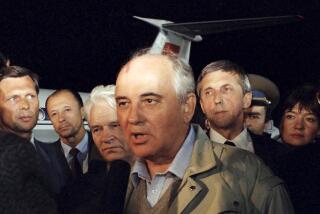Soviets, in Rare Move, Praise Stalin’s Yalta Role
- Share via
MOSCOW — Josef Stalin, who is rarely mentioned in public here, won high praise Monday from an official Soviet spokesman at a briefing on the 40th anniversary of the controversial Yalta Conference during World War II.
Foreign Ministry spokesman Vladimir B. Lomeiko portrayed Stalin as a dedicated peacemaker in the decisions taken at the Feb. 4-11, 1945, Yalta Conference. Critics contend that the decision to split defeated Nazi Germany into occupation zones and other moves taken at the conference resulted in the postwar division of Europe.
Lomeiko described Stalin as a studious, flexible leader who was willing to go more than halfway to shape a compromise.
The kind words followed the showing of photographs of Stalin, along with President Franklin D. Roosevelt and British Prime Minister Winston S. Churchill, on the main evening television news program Sunday night.
State-run publications have also have been running photographs of the so-called Big Three at Yalta with articles underlining the importance of the conference in fixing European borders after the war.
Premier Nikita S. Khrushchev, during his famous “secret speech” in 1956, accused Stalin of dictatorial rule that sent millions to prison camps or to their death by execution.
A period of “de-Stalinization” followed the speech, and the city of Stalingrad, where a crucial World War II battle was fought, was renamed Volgograd in 1961.
Stalin’s body was removed from Lenin’s Mausoleum in Red Square where it had lain beside that of V.I. Lenin, founder of the Soviet state. It was placed near the Kremlin Wall.
Criticism of Stalin, leader of the Soviet Union from 1924 until his death in 1953, has eased in recent years. He has in the past been praised for his role as the nation’s wartime leader. But there have continued to be references to unspecified “errors” made during his tenure as Soviet leader.
At Monday’s briefing for foreign journalists, however, there was no criticism of Stalin from the government spokesman.
“Marshal Stalin gave the initiative to Roosevelt and Churchill and not once did he abuse his position as host of the conference,” Lomeiko said.
“He (Stalin) demonstrated a high degree of collegiality . . . and went more than halfway in discussing all proposals,” Lomeiko added.
Lomeiko quoted Churchill as saying that Stalin, in addition to taking part in the conference, stayed up from midnight to 5 a.m. each day to study developments on the war fronts.
Lomeiko would not speculate when a reporter asked if Volgograd would now change its name back to Stalingrad. “Such a decision is taken by municipal councils,” he replied. “. . . It’s outside my competence to guess.”
More to Read
Sign up for Essential California
The most important California stories and recommendations in your inbox every morning.
You may occasionally receive promotional content from the Los Angeles Times.












